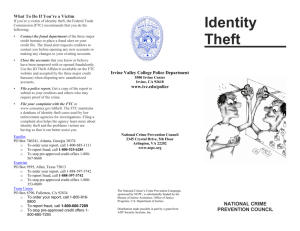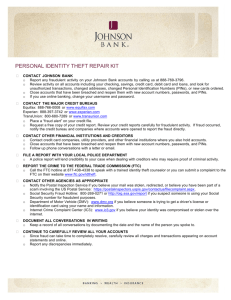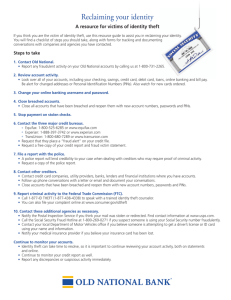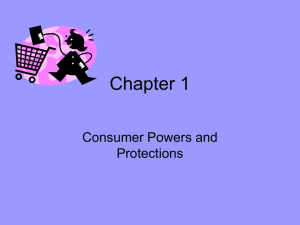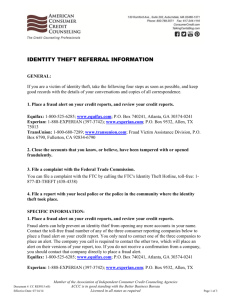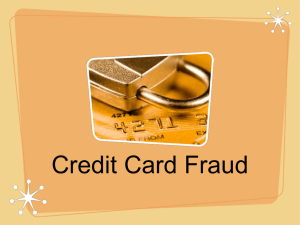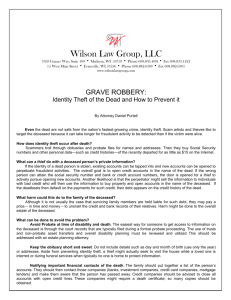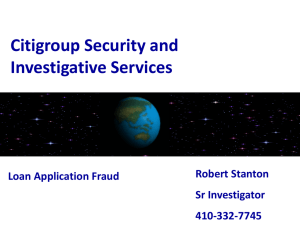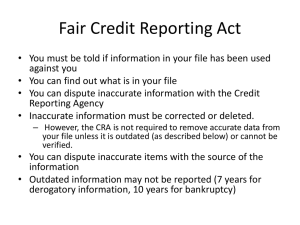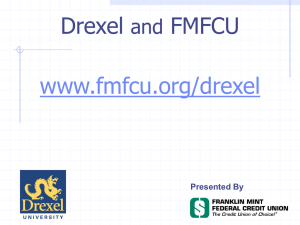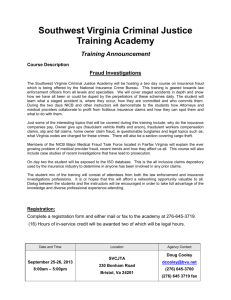Identity Theft Resource Kit - HomeStar Bank & Financial Services
advertisement
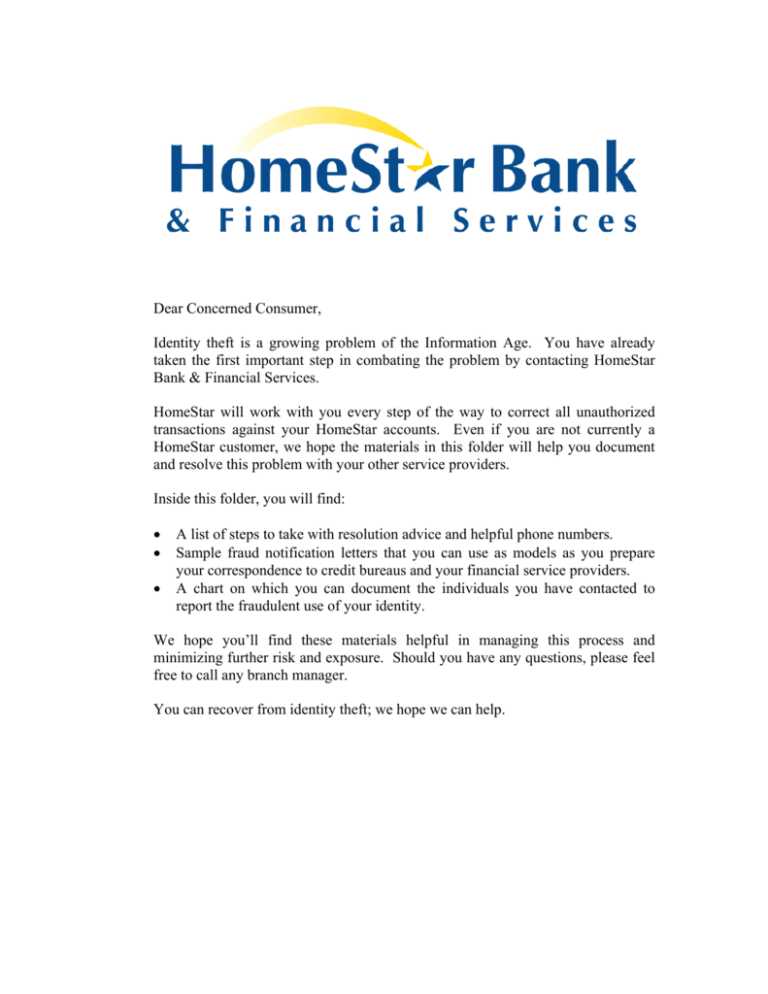
Dear Concerned Consumer, Identity theft is a growing problem of the Information Age. You have already taken the first important step in combating the problem by contacting HomeStar Bank & Financial Services. HomeStar will work with you every step of the way to correct all unauthorized transactions against your HomeStar accounts. Even if you are not currently a HomeStar customer, we hope the materials in this folder will help you document and resolve this problem with your other service providers. Inside this folder, you will find: A list of steps to take with resolution advice and helpful phone numbers. Sample fraud notification letters that you can use as models as you prepare your correspondence to credit bureaus and your financial service providers. A chart on which you can document the individuals you have contacted to report the fraudulent use of your identity. We hope you’ll find these materials helpful in managing this process and minimizing further risk and exposure. Should you have any questions, please feel free to call any branch manager. You can recover from identity theft; we hope we can help. Resolving Identity Theft. Steps to take right now! If you suspect that someone has used your identity fraudulently, it is important that you act as quickly as possible to minimize the damages to your finances and your credit standing. Below, we have outlined the steps that you can take to help resolve this problem. In this folder, you will also find a log on which you can document the steps that you take and the names of the company representatives to whom you speak. 1. Start by contacting the fraud departments of each of the three major credit bureaus. You should call first and then follow-up in writing (see example provided in this folder). Equifax Call: 1-800-525-6285 Experian Call: 1-888-397-3742 TransUnion Call: 1-800-680-7289 Write: P.O. Box 740241 Atlanta, Georgia 30374-0241 Write: P. O. Box 949 Allen, Texas 75013-0949 Write: Fraud Victim Assistance P. O. Box 2000 Chester, PA 19022-2000 www[.]equifax[.]com www[.]experian[.]com www[.]transunion[.]com With each bureau you contact, take the following steps: A. Request a “fraud alert” be placed in your file. B. Request a victim’s statement asking that creditors call you before opening any new accounts or changing your existing accounts. C. Ask for copies of your credit reports. Credit bureaus must give you a free copy of your report if it is inaccurate because of fraud. Review the report carefully to make sure no additional fraudulent accounts have been opened or unauthorized changes made. Check the inquiry section of the report. When inquiries appear from companies that opened fraudulent accounts, request that the inquiries be removed from your report. After reviewing your credit report, call to report fraudulent accounts, then follow the call up with a letter. Include copies (not originals) of documents that support your position. In a few months, order a new copy of your credit report. 2. Contact the creditors for any accounts that have been tampered with or opened fraudulently. These can include credit card companies, phone companies and other utilities, and banks and other lenders. A sample dispute letter is included in this folder. Ask to speak with someone in the security or fraud department and follow up with a letter. Note: It is important to notify credit card companies in writing as that are the procedure that the Fair Credit Billing Act spells out for resolving errors on credit card billing statements. Close accounts that have been tampered with and open new ones with new Personal Identification Numbers (PINs) and passwords. 3. File a report with your local police or the police in the community in which the identity theft took place. Obtain a copy of the Police Report in case the bank, credit card issuer or others need proof of the crime. 4. Contact the Federal Trade Commission’s Identity Theft Hotline at 1877-IDTHEFT (1-877-438-4338). The FTC will put your information into a secure consumer fraud database and may share it with other law enforcement agencies. 5. Below are some of the ways that an identity thief might use your identity and some steps you can take to correct the situation: A. Stolen Mail. If an identity thief has stolen your mail to obtain credit or has falsified change of address forms, contact your local postal inspection service office or check the Postal Service’s web site at www[.]usps[.]gov/websites/depart/inspect. B. Change of Address on Credit Card Accounts. If an identity thief has changed the billing address on an existing credit card account, close the account. When you open a new account, ask that a password be used before any inquiries or changes be made. Avoid using easily available information for a password like a birth date, social security number, etc. C. Bank Accounts. If an identity thief has tampered with your bank account, checks or ATM card, close the suspected account(s) immediately and open new accounts. D. If your checks were stolen or misused, close the account as quickly as possible and open a new account. Also, contact the major check verification company to request that they notify retailers using their database. Telecheck: 1-800-710-9898 E. Investments. If an identity thief has tampered with your securities, investment or brokerage account, immediately report it to your broker or account manager and to the Securities and Exchange Commission. F. Phone Service. If an identity thief has established new phone service in your name and is making unauthorized calls, contact your service provider immediately to cancel the account. If you have trouble getting fraudulent phone charges removed from your account, contact your state’s Public Utilities Commission for local service or the Federal Communications Commission for long distance service providers. G. Employment. If you believe someone is using your social security number to apply for a job or to work, contact the Social Security Fraud Hotline at 1-800-269-0271. H. Driver’s License. If you suspect your name is being used by an identity thief to get a driver’s license or ID card, contact your Department of Motor Vehicles. Sample dispute letter to a Credit Bureau. Date Your Name Your Address Your City, State and Zip Complaint Department Name of Credit Bureau Address City, State and Zip Dear Sir or Madam: I am writing to dispute the following information in my file. The items I dispute are circled on the attached copy of the report I received. (Identify item(s) disputed by name of source, such as creditors or tax court, and identify type of item, such as credit account, judgment, etc.) This item is (inaccurate or incomplete) because (describe what is inaccurate or incomplete and why). I am requesting the item be deleted (or request another specific change) to the information. Enclosed are copies of (use this sentence if applicable and describe any enclosed documentation, such as payment records or court documents) supporting my position. Please investigate this (these) matters(s) and (delete or correct) the disputed item(s) as soon as possible. Sincerely, Your signature Enclosures: (List the documentation you are enclosing. Don’t forget to include a copy of the credit report you received with the disputed item(s) highlighted.) Sample dispute letter to a Credit Card Issuer. Date Your Name Your Address Your City, State and Zip Your account number Name of Creditor Billing Inquiries Address City, State and Zip Dear Sir or Madam: I am writing to dispute a billing error in the amount of $X on my account. The amount is inaccurate because (describe the problem). I am requesting that the error be corrected and that any finance or other charges related to the disputed amount also be credited accordingly. Enclosed are copies of (use this sentence to describe any enclosed documentation, such as sales slips or payment records) supporting my position. Please investigate this matter and correct the billing error as quickly as possible. Sincerely, Your signature Enclosures: (List the documentation you are enclosing) Customer Account Record Use this form to record the steps you’ve taken to report the fraudulent use of your identity. Keep this list in a safe place for your reference. Credit Bureaus – Report Fraud Bureau Equifax Experian Trans Union Phone Number 1-800-525-6285 1-888-397-3742 1-800-680-7289 Date Contacted Contact Person Comments Banks, Credit Card Issuers and Other Creditors (Contact each creditor promptly to protect your legal rights) Creditor Address and Phone Number Date Contacted Contact Person Comments Law Enforcement Authorities – Report Identity Theft Bureau Phone Number Federal Trade Commission 1-877-ID-THEFT Local Police Department Date Contacted Contact Person Comments IDENTITY THEFT HOW TO PROTECT YOURSELF There are many things you can do to reduce the risk of identity theft. A few of those are listed below. 1. Do not routinely carry Debit and/or Credit cards you rarely use, your social security card, or any other non-essential items that contain personal information. Any of these can give an identity thief the opportunity to access not just the information on the card, but also further personal data. For instance, once identity thieves have your social security number, they can apply for a credit card or a driver’s license, access important personal records and begin to assume your identity-all with this one number. 2. Be cautious when providing personal or financial information over the phone. Make sure you are comfortable with the company and the company representative who has contacted you. Best practice is to get the phone number of the person or company calling you and make the call back to them. 3. Shred or tear up unwanted pre-approved credit offers, credit card access checks, bank statements and cancelled checks before you throw them away. 4. Carefully monitor financial statements (bank and credit card statements, investment transaction statements, etc.) so that you may detect any unauthorized charges or withdrawals as soon as possible. Immediately report such unauthorized use to your bank or credit card company. Immediately report lost or stolen checks to your bank. 5. If you regularly receive your monthly bills through the mail and they fail to reach you, contact the company to find out why. 6. Sign up for Online banking and Bill Pay. You can monitor your account activity as often as you like and bill’s can be sent directly to you through bill pay. 7. When using a Debit Card or Credit Card at an ATM, take care to shield the ATM keypad when entering your PIN number when others are present. Always take your receipts with you-don’t throw it in the trash. 8. Make a list of all debit and/or credit cards, bank accounts and related account numbers, as well as the corresponding customer service phone numbers. Keep the list in a safe place (not your purse or wallet). Also, cancel credit lines that you no longer use. 9. Store cancelled checks, any paper statements and unused checks in a safe place. 10. Do not put outgoing mail, especially bill payments in your mailbox. Take the time to drop it into an official Postal Service box. Identity thieves sometimes obtain personal information by stealing outgoing mail. 11. Once a year, order a copy of your free credit report and check it for accuracy. To request your credit report: Equifax Call: (800) 525-6285 Or write: P.O. Box 720241 Atlanta, GA 30374 Online: www[.]equfax[.]com Experian Call: (888) 397-3742 Or write: P.O. Box 949 Allen, TX 75013-0949 Online: www[.]experian[.]com TransUnion Call: (800) 680-7289 Or write: PO Box 2000 Chester, PA 19022 Online: www[.]transunion[.]com 12. To remove your name from mailing lists and telephone solicitation lists contact: Direct Marketing Association Mail Preference Service PO Box 9008 Farmingdale, NY 17135 Direct Marketing Association Telephone Preference Service PO Box 9014 Farmingdale, NY 11735 13. To opt out of pre-approved offers and marketing lists call: TransUnion (800) 567-8688. 2014
